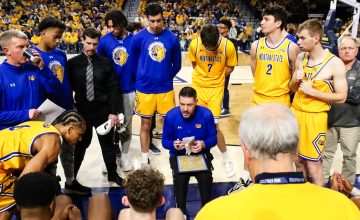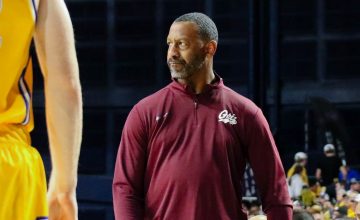Jessie Clark knew he would need great courage. He knew he would be out of his element. He knew he would be transported to a different world the moment he stepped foot in the Treasure State.
Everywhere he went when he first arrived in Montana, Clark did not see anyone that looked like him, a chiseled black man with long, thick dreadlocks. Everyone he talked to did not sound like him, his accent with a touch of Cajun standing out even more than his Southern soul.
Clark had already moved 1,900 miles from home once to chase his gridiron dreams. He had already left his daughter Aamiyah back home in Amite City, Louisiana with her mother, Aaliyah Gardner-Steptoe with Clark’s mother, Dionne Pierre and grandmother, Deloris Pierre close by. Trekking from Amite City to Los Angeles is quite a journey, at least in distance. Moving from the deep South to the heart of the Rocky Mountains seemed like a much more daunting proposition.
 His life had already been marked by catastrophe and defined by new beginnings. His father was not around during his childhood. When Hurricane Katrina decimated his mother’s home, the family had to start anew. But Clark found solace in his family and consolation in his grandmother’s Southern cooking.
His life had already been marked by catastrophe and defined by new beginnings. His father was not around during his childhood. When Hurricane Katrina decimated his mother’s home, the family had to start anew. But Clark found solace in his family and consolation in his grandmother’s Southern cooking.
When he first arrived in Montana, the Montana State senior faced adversity, first in earning eligibility and then to stay on track academically. He tested his ability to acclimate to his strange surroundings right away after spending most of his first 21 years living in places filled with diversity and black culture. In time, Clark began to love the change of scenery. The mountains were awe-inspiring, his new teammates accepting and the community of Bozeman welcoming. Just as he began to find security in his new home, snow began to fall from the Gallatin Valley’s big sky. The first signs of winter struck Clark to his core and he wondered where on earth he was.
“My first thought was, ‘Who lives in this?’” Clark said as he stood on the Bobcat Stadium turf following Wednesday’s practice. “Who live like this, man? Why would you ever live somewhere where you can freeze to death?”
Experiences that seemed from another world continued. Clark could not believe his eyes the first time a black bear dug into his garbage can in the middle of the night. He was “spooked” the first time he saw deer roaming in his yard. Clark could not believe people would ever live in a place where the temperature drops below zero or in a town where candied yams, collard greens and Cajun-style fried chicken are so hard to come by. He found the way Montanans interacted perplexing, saying he was taken aback by how friendly everyone was to him, the ease at which conversation started and flowed. Coming from the Gulf Coast, he was not used to “cross breeding”.
 These days, winter isn’t nearly as unnerving, nor are the once-foreign elements surrounding Clark. The boy from the bayou has grown into an outdoorsman. He spends his spare time hiking around Bozeman, Hyalite Canyon among his favorite destinations. He also recently took up shooting, sometimes practicing with rifles at the top of his Hyalite hikes. Once football is over, Clark is determined to get an elk or deer tag and trying his hand at big game hunting.
These days, winter isn’t nearly as unnerving, nor are the once-foreign elements surrounding Clark. The boy from the bayou has grown into an outdoorsman. He spends his spare time hiking around Bozeman, Hyalite Canyon among his favorite destinations. He also recently took up shooting, sometimes practicing with rifles at the top of his Hyalite hikes. Once football is over, Clark is determined to get an elk or deer tag and trying his hand at big game hunting.
“I was so, so scared at first,” Clark said of his initial arrival in Montana last summer. “Big culture change, a lot of different people, winter, the snow. That was one of the biggest things I had to think about was the weather. But I adapted to it and once you are used to it, you are used to it.
“Adapting, meeting new people, I like it a lot. I get to experience things I never experienced before.”
Clark’s life to this point has been filled with new and, for the most part, trying experiences. He grew up in a single-mother household with an older brother and a younger sister from Dionne and “too many brothers and sisters” on his father’s side. Clark’s father wasn’t around when he was a kid while Pierre made her living working at a local grocery story in the rural 4,000-person farm town 60 miles Northeast of Baton Rouge.
When Clark was in sixth grade, Hurricane Katrina ripped through the Gulf, destroying thousands of homes and changing innumerable lives. Clark’s family’s home was completely wiped out.
 “We didn’t have lights for a long time,” Clark said. “We had a bath house, had to take a bath outside. We didn’t have school for a whole month and a half so that was cool (laughs). But watching my mom lose her house and try to find a new house was crazy. Our house was destroyed.
“We didn’t have lights for a long time,” Clark said. “We had a bath house, had to take a bath outside. We didn’t have school for a whole month and a half so that was cool (laughs). But watching my mom lose her house and try to find a new house was crazy. Our house was destroyed.
“My mom, she encouraged us to stay strong because she always stayed strong. She made the way. We also had my grandmother who supported us when my mom couldn’t. My mom worked every single day, even when Katrina was going, I remember her leaving and going to work and still coming back home after work and cooking.”
Aamiyah was born in November of 2010 two months short of Clark’s 16th birthday. He struggled to finish high school after her birth and ended up as an NCAA non-qualifier, forcing him to take the junior college route in pursuit of his football aspirations.
Amite City is a plantation town whose original landowners ran the Blythewood Plantation, a cotton farm of more than 3,000 acres. Today, the town’s economic base is still agricultural. Almost 55 percent of the population is African American. The per capita income for the town is just $14,565 annually and 28 percent of Amite City’s residents live under the poverty line.
“Jessie might as well be from Mars,” MSU defensive coordinator Ty Gregorak said. “What his family has gone through, the big storm this summer, Katrina, I can’t imagine. We all come from different walks of life. You can tell Jessie is definitely from the sticks in Louisiana. And he has a heart of gold because of it.”
When Clark first signed with Montana State in February of 2015 a few days after National Signing Day, the athletic, explosive defensive end’s commitment caused the coaching staff to burst into celebration. Could 6-foot-2, 245-pounder be the next great defensive end in the long lineage of pass rushers who have cut their teeth in Bozeman? The Bobcat coaching staff certainly hoped so.
After choosing MSU over South Alabama despite its proximity to his home, Clark himself was excited for the opportunity to play for a winning program in a stadium almost guaranteed to sell out every home game. But the cultural acclimation he would have to endure would be much more challenging then expected.
Despite signing in February, Clark needed to pass a full slate of classes in both the spring and summer sessions at L.A. Harbor. Michael Pitre, MSU’s running backs coach and Clark’s primary recruiter, devised a specific plan for Clark to earn his eligibility. Still, MSU had already taken several risks that recruiting season, from non-qualifiers from the prep ranks like defensive end Eric Prevost and tight end Robert Evans to JC non-qualifiers like defensive tackle WaWa Leota.
When Clark first arrived on campus, he had multiple issues with his transcripts. As is typical with late junior college transfers, particularly ones who need summer classes in order to become Division I eligible, the dean of the school needs to submit a signed letter assuring the NCAA Clearinghouse the student-athlete has earned his associate degree. The L.A. Harbor dean wrote such a letter on Clark’s behalf only to call to inform Beck that Clark was a credit short. Clark went to Fullerton College for a brief time initially out of high school before following the coach to L.A.
“When he got here, it was a freakin’ nightmare,” former Montana State defensive line coach Bo Beck said. “During the first week of two-a-days when he first got on campus, any time I wasn’t on the field, I was on the phone with his school.”
 Clark missed the first week of fall camp last August while the transcript issue was ironed out. The dean continued to deny Clark’s eligibility despite the letter and Beck’s pleading. Beck said Clark was “in tears almost every day.” Finally, the issue was resolved and Clark began to practice. Beck and the rest of the defensive staff rejoiced once again. Clark expressed jubilation in his first interview with the local media last August.
Clark missed the first week of fall camp last August while the transcript issue was ironed out. The dean continued to deny Clark’s eligibility despite the letter and Beck’s pleading. Beck said Clark was “in tears almost every day.” Finally, the issue was resolved and Clark began to practice. Beck and the rest of the defensive staff rejoiced once again. Clark expressed jubilation in his first interview with the local media last August.
On the field, he instantly showed an elite natural pass rush ability, his fluid hips and solid balance allowing him to explode around offensive tackles with ease.
“When he makes up his mind he’s going to go, it’s over,” Montana State junior left tackle Dylan Mahoney said. “There shouldn’t be anybody in this conference who can touch him.”
While Clark’s skills were apparent, he struggled to grasp the demands heaped upon him, from school to scheme to transportation. After about a month in Bozeman, Clark weighed just 220 pounds. Beck eventually found out at least part of the problem was Clark was running to and from campus every single day.
“Rain, shine, he didn’t care,” Beck said. “I tried to show him the bus system. And he just said, ‘No, coach, it’s good for me. I need the extra workout.’ He’d get up and run at five in the morning several miles to campus. He’s used to not being able to rely on people so he just does it himself.”
 Beck also found out that Clark was not eating. Clark did not understand how his scholarship worked, that he received a monthly stipend to use on food and rent. And he couldn’t find food like his grandma cooked anywhere around. Instead, Clark would send any bit of money he received, scholarship or otherwise, back to Amite City. Rather than going to the dining hall or a restaurant or the grocery store, Clark would live on bagels so he could send as much help home as he could.
Beck also found out that Clark was not eating. Clark did not understand how his scholarship worked, that he received a monthly stipend to use on food and rent. And he couldn’t find food like his grandma cooked anywhere around. Instead, Clark would send any bit of money he received, scholarship or otherwise, back to Amite City. Rather than going to the dining hall or a restaurant or the grocery store, Clark would live on bagels so he could send as much help home as he could.
“Family back home, what I’m trying to achieve, my little girl plays a big role in coming all the way out here to play football,” Clark said. “That’s what I work for every day.”
After a few months in Bozeman, Clark began to find his way. He struck up a friendship with Koni Dole, a linebacker from a Polynesian background with a much-chronicled story of courage. Dole walked on out of Huntley Project despite losing his right leg due to a post-surgical complication from a gruesome fracture his junior year of high school. That relationship sparked many others and now Clark is one of the most popular members of the Bobcats.
“Being the Southern boy he is and coming into a program where he knows literally no one, he’s a different kind of breed when it comes to opening himself up and wanting to get to know anyone and everyone,” said MSU senior defensive tackle Matt Brownlow, a native of Missoula. “Coming from where he was to where he is now has been impressive.”
Last season, Clark broke into the starting lineup midway through the season. Despite limited playing time, he rolled up 5.5 sacks, tied for the third-most in the Big Sky Conference. He has two sacks this season and his forced fumble against Western Oregon gives him four for his career, just outside the top 10 in school history.
“He’s got great get off at the line of scrimmage,” MSU head coach Jeff Choate said. “I think that’s what Jessie does best: turn it loose on the edge.”
 At the end of last season’s 5-6 debacle, longtime head coach Rob Ash, Beck and the majority of the MSU staff was not retained.
At the end of last season’s 5-6 debacle, longtime head coach Rob Ash, Beck and the majority of the MSU staff was not retained.
“When Rob got fired, he was a mess,” Beck said. “He was going to leave. He always felt the world was going to hand him something bad. But now I think he’s thriving. He’s a see-ball, hit-ball kid. I thought he improved more than any other kid on the team last year.”
Clark has dedicate himself in the classroom to stay eligible. He is studying sociology and criminology but has other desires once he earns his degree. He will try out for NFL scouts and if playing on Sundays isn’t in the cards, he will join the Navy. He hopes to someday do maintenance on ships and jet planes.
The young man from the heart of Louisiana said his love for Montana has grown to the point where he would consider staying if it wasn’t so far away from his family. With six games left in his senior year, he hopes to relish in his final months playing the game which has brought him on such a winding, rewarding journey.
“It taught me how to be self-reliant, grow up and be a man far from home, so far from home,” Clark said. “I’ve had to adapt to new things, the environment of being around new people. It’s taught me so much.”
The full scope of Clark’s experience over the last year-plus living in the Gallatin Valley might only compare to the amount he has taught others. His engaging, unassuming demeanor is inviting and his Southern roots shine through in his politeness. He said all the men he’s crossed paths with at MSU are “my brothers” and will be “lifelong friends.” Those who have shared a locker room with him agree.
 “I don’t know what Louisiana is like,” said MSU senior captain Gunnar Brekke, a running back from Helena. “I’ve never been there. That’s a completely different world down there. He grew up completely different. But at the end of the day, he’s just like every one of us. He has the same purpose we have. He’s shown me that no matter where you are from, if you get a group of guys between the white lines, you can bond anyone. I don’t care where you are from, what color your skin is, how you grew up. Jessie has driven that home to me. I really can’t say enough about how much he’s taught to me.”
“I don’t know what Louisiana is like,” said MSU senior captain Gunnar Brekke, a running back from Helena. “I’ve never been there. That’s a completely different world down there. He grew up completely different. But at the end of the day, he’s just like every one of us. He has the same purpose we have. He’s shown me that no matter where you are from, if you get a group of guys between the white lines, you can bond anyone. I don’t care where you are from, what color your skin is, how you grew up. Jessie has driven that home to me. I really can’t say enough about how much he’s taught to me.”
Photos by Brooks Nuanez. All Rights Reserved.















